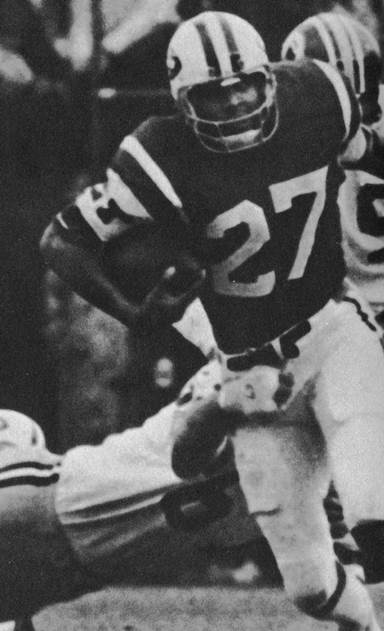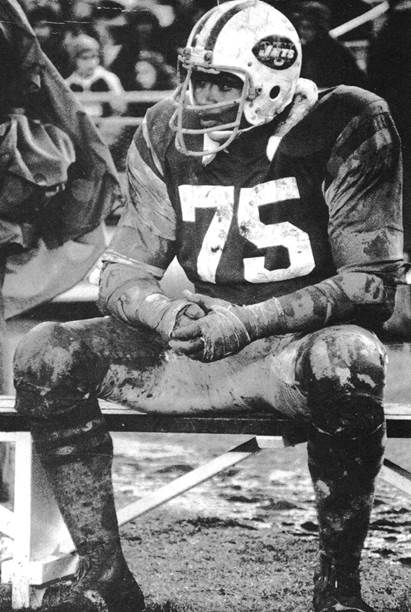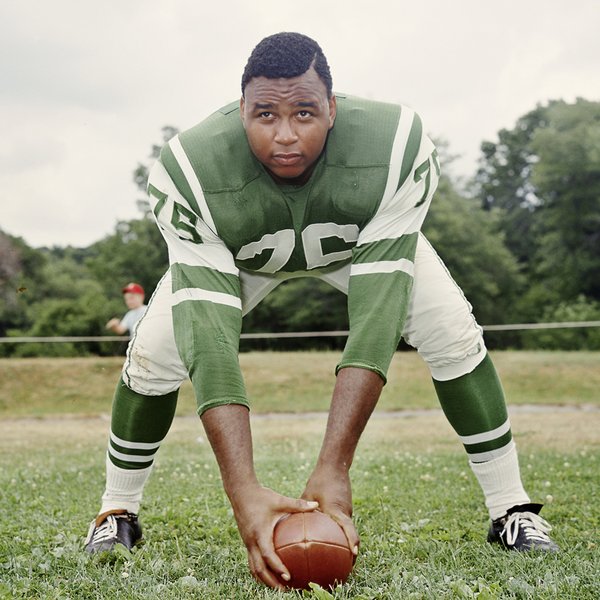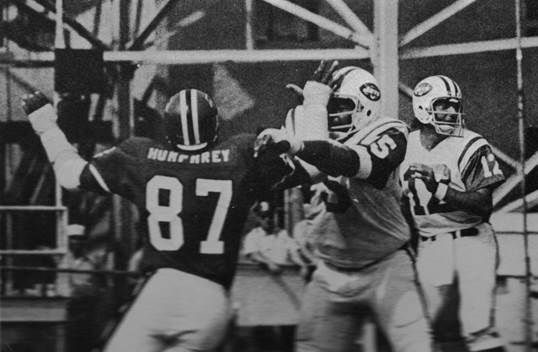

WINSTON HILL, THE JETS' ROCK
HELMET HUT NEWS/REFLECTIONS June 1 2016:
WINSTON HILL, THE JETS' ROCK
By Dr. Ken
Phil Wise was an
aggressive defensive
back for the Jets 1971
through 1976
Phil was a defensive back
out of the University of
Nebraska Omaha that played
rather well for much of his
career with the Jets. From
1971, after joining the team
as a sixth round draft
choice, through ’76, he
started in the secondary and
played on special teams.
Phil completed his NFL
career with the Vikings from
’77 through ’79 and remained
in the Minneapolis area as a
sports radio personality.
With the Jets however, he
latched onto strength
training as a means to
improve his game, often
teaming up with fellow
defensive back Steve Tannen.
Wise however, was anxious to
mine as much helpful
information as possible and
that included improving his
nutrition. We had numerous
conversations relative to
dietary intake which led to
an attempt to give Phil
recipes so that he could
cook and bake in a
“healthier” manner. It was
quickly apparent that this
would not work and for a
good part of the Jets’
season I would bake low fat
yogurt cheesecakes and
flourless cakes and bring
them to Wise in the Hofstra
facility. Making it clear
that I was not in the bakery
or restaurant business, I
was able to deflect the
friendly pastry requests by
other players but on one
occasion, offensive tackle
Winston Hill asked to speak
to me.
Jets’ offensive tackle
Winston Hill had a
presence that dwarfed
his considerable
physical stature
As noted by Hill’s long-time
friend and Colorado
Congressman Ken Buck,
“Growing up as a black
person in East Texas in the
1940s and 1950s could
destroy a young man's
self-confidence and
optimism, and even limit his
achievements in life. But my
friend Winston Hill never
let racism, bigotry or
adversity stand in his way.
With the support of his
family, his faith and his
friends, Winston wouldn't
allow the world to tell him
who he could or couldn't
be.” Buck also stated, “It
would be understandable if
the bitter taste of
childhood racism and
alienation made Winston a
harsh, unforgiving adult.
Instead, he embodied
kindness, forgiveness and
humility — the man was
fundamentally selfless. He
never had a bad thing to say
about anyone…” Tennis became
an interest and he worked
hard to become a star
athlete on the courts. With
size, strength, and terrific
footwork, however, football
seemed like a natural avenue
to success.
In 1964 Hill established
himself as a full time
starter and in the early
part of his career
primarily manned the
left offensive tackle
position while serving
occasional duty as
center. He was agile and
strong enough to play
any of the offensive
line positions and his
proficiency was rapidly
noticed. In 1965 with
the arrival of
quarterback Joe Namath,
Winston was noticed
enough to be an American
Football League All Star
and from 1967 through
’73, he was named to
either an AFL All Star
or NFL Pro Bowl squad.
His superior play in the
AFL found him named to
the All Time AFL Second
Team. He was almost
immediately recognized
as a gifted pass blocker
and with the famous
Namath to protect,
perhaps it was assumed
that this was his
primary focus. Jets
fullback Matt Snell
stated that Hill was “so
graceful, so beautiful
to watch. Took them just
where he wanted them
(defensive linemen) to
go. Never seemed like he
was exerting himself
that much.” Although his
initial recognition came
as one of the best pass
blockers in the league,
he utilized his great
strength as a dependable
run blocking lineman
also, and of course
received that delayed
recognition after the
Jets Super Bowl upset of
the Colts that saw Snell
gain his primary yardage
behind Hill’s left side
of the Jets offensive
line. “I’ve been telling
reporters for a long
time that Winston Hill
is a great offensive
tackle,” victorious
coach Weeb Ewbank said
after Super Bowl III,
“and (in the Super Bowl)
he proved it. I mean,
when he blocks he
doesn’t just a get a
stalemate with the guy
he’s on. He blows him
out.” Hill’s success was
very much predicated on
the pressure he placed
upon himself to improve
and learn. In 1971,
Hill’s ninth
professional season,
offensive line coach
Wimp Hewgley said,
"Winston is a very
analytical person,
always searching for a
better method of doing
things. He's always
asking if he's doing the
correct thing. If not,
he wants to know why.
It's the kind of thing
you would expect from a
rookie, not someone who
has been around all
these years."
When entering the New York Jets
locker room, one could not miss
Winston Hill. Although large for
his era at 6’4” and 270 pounds,
there were many other National
Football League linemen just as
big or bigger. Yet Hill filled a
room with both his physical size
and the manner in which he
carried himself. Sadly, like so
many of his football
contemporaries, he passed away
this past April 26th
at the age of seventy-four.
Among the many individuals the
author has met or spent time
with, Hill was among the most
memorable.
The author’s personal
circumstances were at one time,
similar to many young people who
have family responsibilities
while pursuing an education.
Concurrent employment in a
number of disparate areas and
school attendance required time
and effort which led to eventual
academic and vocational success.
After working as a lumberjack in
the Solon, Maine area for a six
month period, returning to
school to enhance my graduate
education did not obviate the
need for hard work and a steady
income. Thus backstage and
travel related security work in
the rock and roll industry, iron
work, and applying the skills of
a line cook, all of which could
have qualified as a return to
previous vocations, allowed for
support of the family and a
return to school. The New York
Jets, with their training
headquarters at Long Island’s
Hofstra University placed many
of their players in the Point
Lookout-Long Beach area I grew
up in. In those pre-Yuppie-
gentrification-of-Point Lookout
days, and while the Jets had no
more than a nascent strength and
conditioning facility, a number
of their players gravitated to
our garage gym as well as one of
the very few local commercial
training facilities nearby. Some
of the Jets, with defensive back
Phil Wise among them, had an
active interest in training and
diet.

If there was one member of
the Jets I was uncomfortable
around, it was Hill. One
would think that the great
Joe Namath would be the Jet
that was intimidating to
approach, but Joe offered me
a ride to Manhattan one day,
insisting that I join him in
the front seat of his
Cadillac so that we could
talk. I deferred, feeling
that it was inappropriate to
sit in the front passenger
seat while the much taller
Tannen and Wise jammed
themselves into the rear
seat. Joe immediately put me
at ease by saying, “I see
you around all the time,
you’re the lifting guy. Tell
me some things about
yourself so I can know you.”
This was unexpected yet
highly appreciated and
Namath’s complete lack of
“celebrity” in his private
time was revealing and
predicted the same type of
unpretentious behavior in
any other personal encounter
or conversation I had with
him from that moment
forward. Winston Hill
however, was always a true
presence and despite being
reserved, had a quiet
strength and dignity about
him that was exceptionally
powerful and yes,
intimidating. I had been
told by everyone connected
to the team that Hill was
“the man,” “definitely a
leader,” and the word
“great” prefaced many
descriptions of the skilled
offensive tackle by
teammates and coaches, but
his palpable aura put me on
edge. Wise told me that Hill
wanted to talk with me and I
almost felt as if I was
repeating my frequent trips
to the high school
principal’s office.

Any concerns I had about
Winston Hill were quelled in
our first conversation. He
had questions about
conditioning and what I
found in subsequent
discussions was a man of
deep thought who had lived
through what I would have
considered a difficult and
frightful upbringing. Having
hitchhiked from New York to
Baton Rouge, Louisiana and
working briefly in both the
Gulf of Mexico and along the
“East Texas Corridor,” I had
but a glimpse of the racial
divide that existed in the
1960’s and previous decades.
Hill grew up in Joaquin,
Texas and attended the
segregated Weldon High
School in Gladewater where
his father Garfield was the
school principal. Gladewater
is approximately twelve
miles from Longview, the
site of one of the
Southwest’s worst race
riots. The racially
motivated dragging death of
James Byrd Jr. in Jasper and
the racist reputation of
so-called “Sundown Towns”
like Vidor marked the east
Texas region of Winston
Hill’s youth. Hill dealt
with prejudice by doing his
best, by excelling, and by
taking on every challenge
with dignity and purpose.
The absence of a youth
football program due to
segregation and Winston’s
desire to play pushed his
father to start a team and
Hill overcame his asthma and
a heart defect to become an
outstanding player at Weldon
High School. With
segregation again allowing
for limited options in the
South and Southwest, Hill
accepted a scholarship offer
from historically Black
Texas Southern University in
Houston and entered as a
member of the freshmen team
of 1959. His understated
toughness, intelligence, and
willingness to work hard
enough to do everything as
well as possible as a
two-way linemen, led to NAIA
All American and All
Southwest Athletic
Conference honors. He was
drafted in the eleventh
round of the 1963 draft by
the Baltimore Colts but
released in the pre-season.
With former Colts head coach
Weeb Eubank the new mentor
of the remodeled New York
Jets, Hill was yet another
of a number of “former
Colts” that were embraced by
the previous Titans team
that was being rebuilt in
Eubanks’ image.


Through his fourteen
seasons with the Jets
which included his
rookie season where he
did not step onto the
field during a game,
Hill compiled a streak
of 174 consecutive
starts, the tenth
longest in pro football
history. When Namath
went to the Los Angeles
Rams for the ’77 season,
Hill went with him and
they both retired
afterwards. Winston Hill
could then look back and
view a lengthy list of
achievement: induction
to the Texas Southern
Sports Hall Of Fame;
selection to four AFL
All Star Teams and the
Second Team All Time AFL
squad; a member of the
Jets All Time Four
Decade Team and
induction to their Ring
Of Honor; the Jets
retirement of his number
75 jersey.